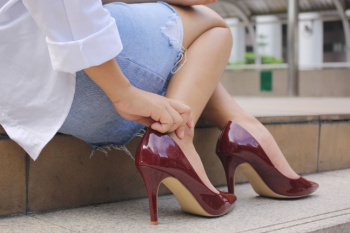
Wearing high heels can transform the way we walk, influencing posture and gait dynamics in subtle yet significant ways. The elevated heel of high-heeled shoes prompts a redistribution of body weight, causing the pelvis to tilt slightly forward and the spine to arch gently. This adjustment creates the illusion of longer legs and a more defined silhouette, enhancing confidence and poise. Additionally, high heels encourage shorter, more deliberate strides, leading to a smoother and more controlled walking motion. The lifted heel also engages the calf muscles and accentuates the curve of the buttocks, contributing to a more graceful and elegant stride. Despite these perceived benefits, it is important to note that prolonged wear of high heels can place strain on the feet, ankles, and lower back, potentially leading to discomfort and musculoskeletal issues over time. So, while high heels can indeed enhance the aesthetic appeal of walking, it is essential to strike a balance between style and comfort for optimal foot health. If you would like more information about the effect high heels have on walking, it is suggested that you consult a podiatrist.
High heels have a history of causing foot and ankle problems. If you have any concerns about your feet or ankles, contact one of our providers from Gentle Touch Foot Medspa. Our staff members can provide the care you need to keep you pain-free and on your feet.
Effects of High Heels on the Feet
High heels are popular shoes among women because of their many styles and societal appeal. Despite this, high heels can still cause many health problems if worn too frequently.
Which Parts of My Body Will Be Affected by High Heels?
- Ankle Joints
- Achilles Tendon – May shorten and stiffen with prolonged wear
- Balls of the Feet
- Knees – Heels cause the knees to bend constantly, creating stress on them
- Back – They decrease the spine’s ability to absorb shock, which may lead to back pain. The vertebrae of the lower back may compress.
What Kinds of Foot Problems Can Develop from Wearing High Heels?
- Corns
- Calluses
- Hammertoe
- Bunions
- Morton’s Neuroma
- Plantar Fasciitis
How Can I Still Wear High Heels and Maintain Foot Health?
If you want to wear high heeled shoes, make sure that you are not wearing them every day, as this will help prevent long term physical problems. Try wearing thicker heels as opposed to stilettos to distribute weight more evenly across the feet. Always make sure you are wearing the proper shoes for the right occasion, such as sneakers for exercising. If you walk to work, try carrying your heels with you and changing into them once you arrive at work. Adding inserts to your heels can help cushion your feet and absorb shock. Full foot inserts or metatarsal pads are available.
If you have any questions please feel free to contact our office located in Arlington, TX . We offer the newest diagnostic and treatment technologies for all your foot and ankle needs.

